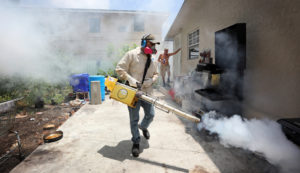Authorities in Florida consider using another aerial agent targeting mosquito larvae, after seeing success on aerial spraying against mosquitoes that carry Zika virus.
After the planned spraying on Wednesday was delayed, Florida finally began killing mosquitoes aiming to prevent the condition from spreading, and it turned out successful.

At dawn of Thursday, Miami-Dade County authorities sprayed droplets of an insecticide called Naled, marking their first aerial mission since local transmission of Zika was confirmed in an area of about 2.6 square kms around the trendy Wynwood arts district near downtown Miami.
Dr. Tom Frieden, head of the U.S. Centers for Disease Control and Prevention says aerial spraying of Naled is killing many mosquitoes in a Miami neighborhood where the insects apparently transmitted Zika.
Florida health authorities have identified 15 Zika cases spread by local mosquitoes and expect there may be more, although no additional cases were reported on Thursday.
Dr. Frieden says aerial spraying that began Thursday quickly killed adult mosquitoes that pesticides on the ground couldn’t reach.
“They had very high kill rates in the mosquito traps there,” he said at a news conference.
He explained that the aerial spraying inserts insecticides into places that cannot be reached by fogging trucks or ground crew spraying chemicals from backpack units.
State health officials are investigating one case from outside of the affected Wynwood district. However, authorities stressed that an isolated case was not yet enough to indicate a second area of active transmission.
State officials are also monitoring 393 cases linked to travel abroad, which include 55 cases involving pregnant women.
Authorities sought to quell any concerns about safety from the chemical when sprayed appropriately, noting Naled has long been used in controlling mosquitoes in Miami-Dade County and around Florida.
On Thursday, President Barack Obama urged the Congress to approve more funds to fight Zika’s spread in the United States, saying that money to fight the outbreak is rapidly running out. Congress has not acted on the request yet.
Zika virus is believed to cause birth defect called microcephaly, a condition defined by small head size, especially when a pregnant woman is bitten by the mosquito.
